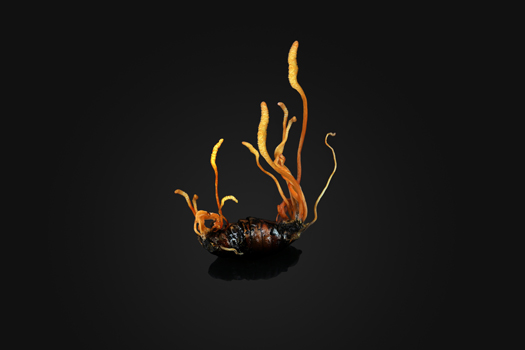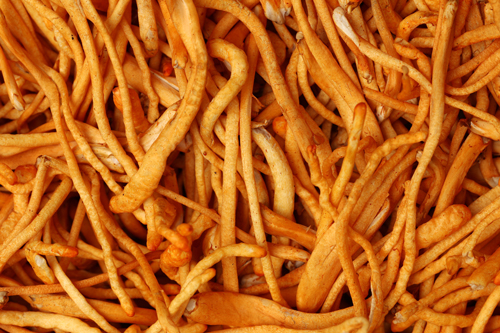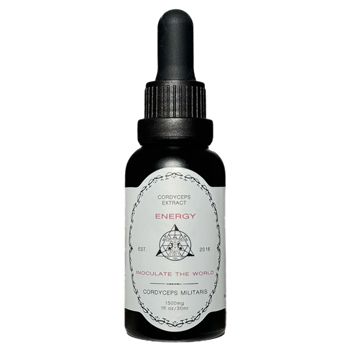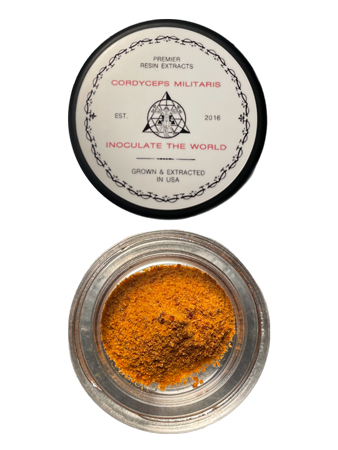Cordyceps are a fascinating type of mushroom that’s become popular in recent years, and that’s because cordyceps’ benefits to human health are finally becoming understood. As an avid weightlifter, I’ve been struggling with lingering fatigue and endurance issues after a recent COVID infection, so I was curious to see whether a Cordyceps tincture could help.
It also led me to want to explore the research around the benefits of cordyceps to see what may be going on when we take cordyceps supplements.
What are Cordyceps?
Cordyceps mushroom benefits are particularly intriguing given that this diverse genus of fungi— which grows from a parasitic attachment to a host—also offers health advantages to humans. The cordyceps genus contains hundreds of species, like Cordyceps militaris, Cordyceps sinensis, among others, which all feed off of different insects and arthropods. When the fruiting body sprouts, it grows in a tendril-like formation directly from its insect host.

Because of the creepy way cordyceps grow, they’ve become a cultural fixation in recent years, popularized by media like HBO’s The Last of Us. Fortunately, the idea that cordyceps could become parasitic to humans has no basis in reality, but the mushroom’s medical benefits are becoming more apparent in recent scientific literature.
Cordyceps Benefits
Cordyceps’ benefits to human health are numerous; the genus has a long history of use in traditional Chinese medicine, prized for their benefits to the respiratory system, and their ability to enhance energy and immunity. More recently, scientific research has begun to uncover even more of their valuable properties, highlighting their role in boosting overall immunity and reducing inflammation.
Studies also show that cordyceps can enhance energy levels and improve athletic performance, with potential benefits extending to cognitive function as well. As a result, cordyceps are experiencing a renaissance in scientific exploration, revealing their diverse advantages for health and wellness.
Cordyceps Benefits for Immunity and Inflammation
Cordyceps have long been associated with respiratory benefits within TCM (Traditional Chinese Medicine), and these benefits are now coming to light within clinical settings. Cordyceps sinensis was thought to work by activating the immune system, a theory that’s validated by recent studies on the topic.

Cordycepin, the main active compound in cordyceps, has been linked to reduced inflammation throughout the whole body, which is shown to be helpful for individuals with chronic conditions such as asthma, Parkinson’s disease, and hepatitis, just to name a few. Additionally, cordycepin and its derivatives were found to enhance immunity against viral respiratory infections, so it may be used to help treat or prevent respiratory illness.
Cordyceps has also been shown to decrease populations of harmful bacteria in chicks. The results of a study done in Seoul, Korea from 2003 suggest that C. sinensis improved systemic immunity, and gastrointestinal tissues, suggesting that it helps modulate gut health in general.
Cordyceps Benefits for Athletic Performance
Cordyceps’ adaptogenic properties have made it a staple for energy and recovery in Chinese medicine. Long understood to enhance physical performance, cordyceps can help with endurance, especially with high intensity exercise. A 2016 study from the University of North Carolina at Chapel Hill found that consistent supplementation for three weeks was found to improve study participants’ VO2 max—the maximum amount of oxygen someone can utilize during intense exercise.
Relatedly, cordycepin has been found to improve glucose and insulin resistance. Thus, cordyceps supplementation could provide great benefits for someone looking for metabolic/energy regulation support.
Most studies have considered cordyceps benefits for athletic performance through high intensity cardiovascular exercise studies, such as running test studies. Yet, even further benefits are implicated by the way cordyceps work in the body. For instance, they may help you feel less fatigued during exercise, which could be to be due to its effects on ATP production. Many athletic enhancement supplements, such as creatine, target ATP production because the body’s synthesis of ATP is a crucial component for cellular respiration and harnessing energy. It follows that cordyceps benefits to ATP production could enhance athletic performance for much broader groups and exercise types than have already been studied.

After a few weeks of my own experimentation with ITW’s cordyceps tincture, I definitely noticed an improvement in my tolerance for cardiovascular exercise, both during my workouts and my everyday activities. Because I’m relatively young and otherwise healthy, it’s hard to say for certain whether the positive effects I noticed were truly attributable to the cordyceps, or whether they were part of my natural recovery process. However, the results I experienced were compelling enough for me to recommend this to others facing similar issues.
Cordyceps Benefits for Cognition and Brain Health
The bioactives (compounds impacting the body) within cordyceps, such as cordycepin and adenosine, have been found to promote dopamine release, as well as improve motor function and general cognitive abilities. And in fact, many bioactives within cordyceps have far-reaching effects on the central nervous system.
For example, cordyceps have also been found to prevent oxidative damage to the brain, which benefits memory and learning. Cordycepin, the main active compound in cordyceps, has a lot of potential as a neuroprotective substance, preventing the degeneration of memory related neurons. Its mechanism as an antioxidant and anti-inflammatory are highly beneficial to the brain.
Other compounds found within cordyceps, such as adenosine, also have neuroprotective effects. For instance, adenosine enhances memory, cognition and synaptic plasticity, which is the ability to respond to changes in activity in different parts of the brain.
Cordyceps Dosage
As a nutraceutical, cordyceps don’t pose any particular risk for healthy individuals who aren’t allergic to them when incorporating them as part of a healthy diet, capped at around 4 g/day. Our Cordyceps mushroom resin contains 33 mg per serving., which is a strong, recommended dose. Most cordyceps products on the market only contain between 0.04 mg-0.10 mg, which is why users may not notice their effects.

Another option to get your cordyceps dosage is to purchase your own mushrooms, or grow them yourself using our Cordyceps liquid culture. If you grow your own cordyceps, you can use them as gourmet ingredient in food, and they’re great in stir fry, soup, or any other creative way you can think of.
Best Time to Take Cordyceps
Cordyceps can be taken at any time of day, but many people prefer to take them in the morning or before a workout for an energy boost. The most important factor is consistency—cordyceps users start to see benefits for energy and fatigue after three weeks of consistent supplementation. I took my Cordyceps Tincture as part of my morning supplement stack, which helped me ensure I was taking enough to feel the effect.
Cordyceps Side Effects
Cordyceps side effects are possible, especially for those on certain medications. For example, they may interact with diabetes medicines and blood thinners, so it’s not recommended for people who take these medications. It could also cause gastrointestinal upset if you eat them raw, and this usually happens when people react to the fiber within the fungus itself.
I didn’t notice any gastrointestinal effects while using Inoculate The World’s cordyceps tincture. Using our tincture or cordyceps resin, or even just cooking cordyceps before eating them, may prevent GI upset by neutralizing or removing the offending fiber.
Overall, cordyceps offer a wide range of health benefits, from boosting energy and endurance, to supporting immune function and overall well being. Incorporating some form of cordyceps into your routine is a great, natural way to support your overall health and wellness.

